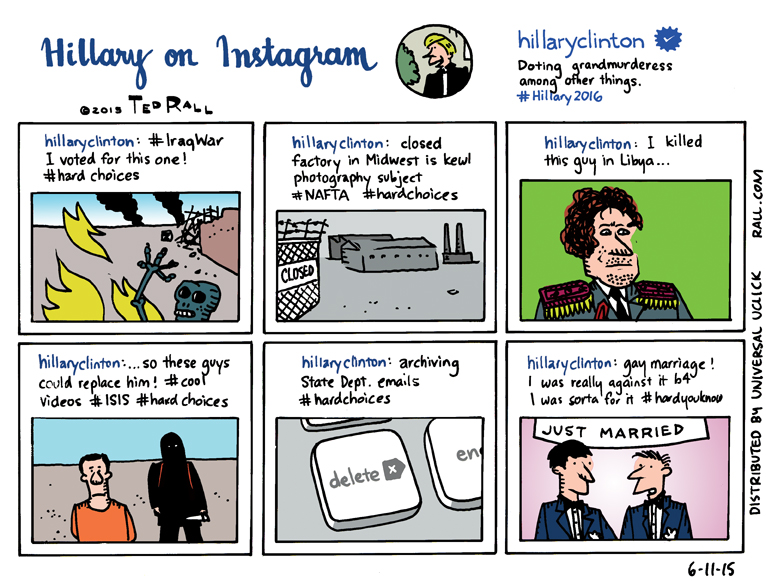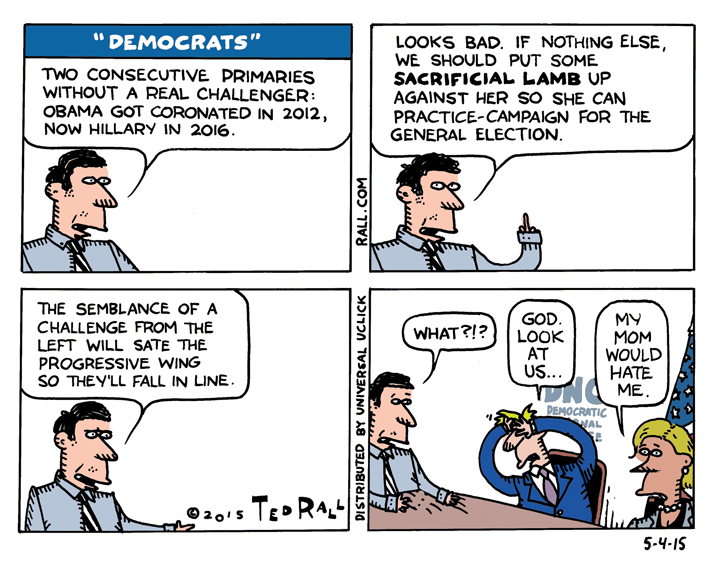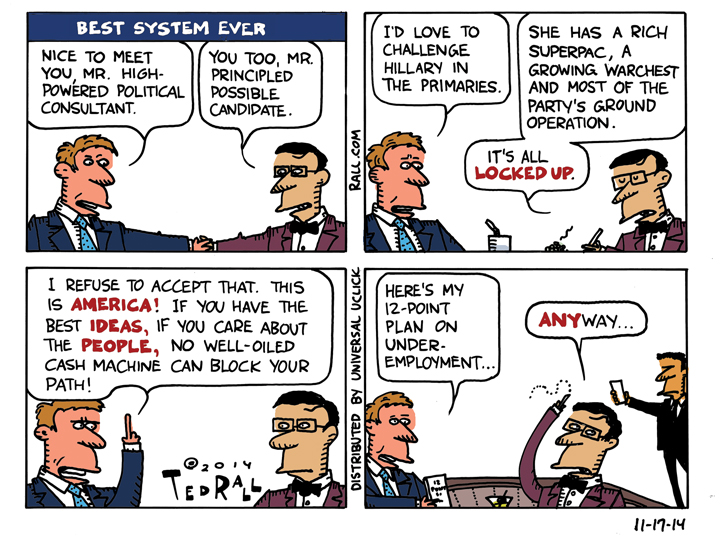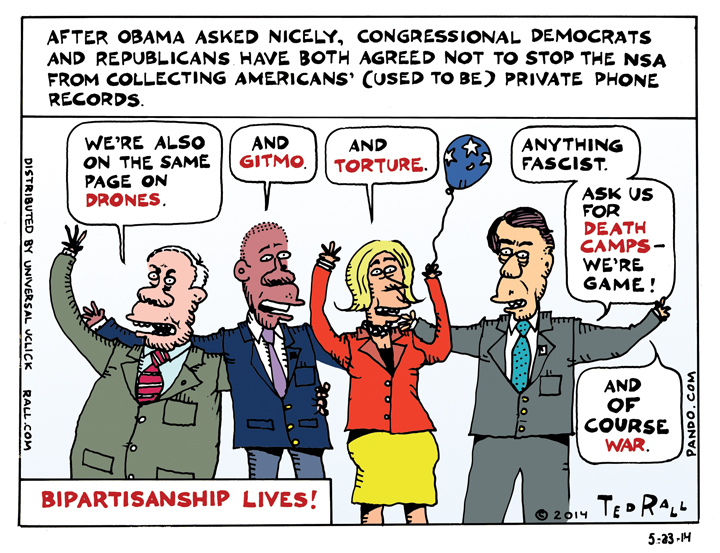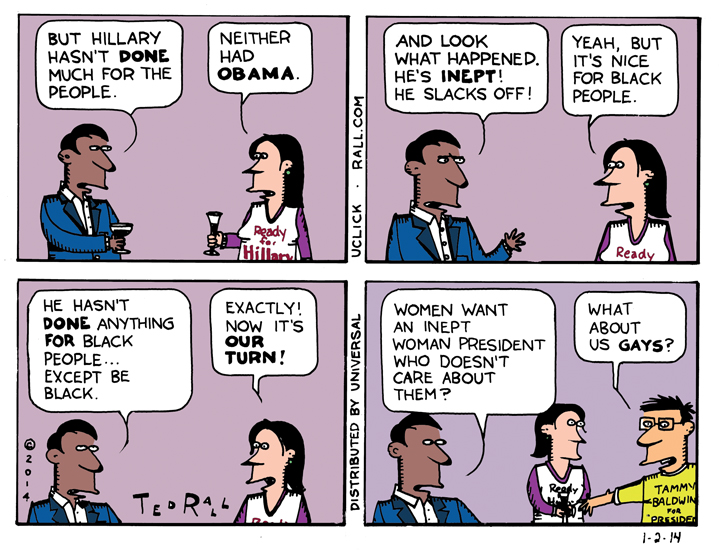The Hillary Rodham Clinton campaign is now on Instagram, with a light joke about “Hard Choices”: a reference to a photo of her pantsuits in red, white and blue. It’s part of the effort to make a politician with blood-soaked hands look like just another ordinary American grandmother…and it just might work.
The Joe Biden 2016 Scenario: Sorta Run, Joe, Sorta Run
Originally published by ANewDomain.net:
There is a scenario in which Joe Biden gets elected president, one that doesn’t involve anything untoward happening to President Obama.
Here’s the short version: Hillary the Inevitable implodes.
(Why not? It happened in 2008.)
Democrats, by which I mean the Democratic party bosses, take a look at her primary challengers — backbenchers and fringies — and opt to pass them all up in favor of the most ready, willing and able establishment candidate. Which, at this point — and likely will continue to be at every point between now and spring 2016 — is Vice President Biden.
Take my hand, won’t you? Accompany me down the not-so-twisty path of the Joe Biden 2016 Scenario …
Now, Biden has often said he was interested. And he is already sort of running. Biden “may be running the most under-the-radar White House campaign of any sitting vice president in modern times,” The Atlantic‘s Russell Berman writes. “Biden made stops in Iowa, New Hampshire, and South Carolina last month. The appearances were all ostensibly aimed at promoting President Obama’s agenda, but as the old axiom goes, no politician visits any of these states by accident, and certainly not in the calendar year before primary voters head to the polls.”
He’s popular enough, as Obama memorably remarked about Hillary.
Biden’s poll numbers track at a steady 41 percent-ish. Not stellar, to be sure. But in polls of Democratic primary voters he’s trounces Vermont Senator Bernie Sanders and former Maryland Governor Martin O’Malley, even though Sanders is the third-most popular senator, which is like being the third-most popular STD. But still.
See how I had to explain who Sanders and O’Malley were just now? That’s because nobody has heard of them. Name recognition is really, really important.
Hillary has problems. Emailgate probably won’t mark the end of Secretary Clinton’s run for the White House by itself, but it fed into a preexisting, and not unjustified, narrative that she and her husband are sleazy, arrogant, entitled and untrustworthy. Fifty-four percent of Americans tell the Quinnipiac poll that Hillary is untrustworthy; only thirty-eight percent of people have confidence in her to tell the truth.
Hillary has been ordered to testify about Emailgate and Benghazi to a hostile Congressional committee — getting interrogated like a criminal on national TV is not an awesome gig for a presidential candidate.
At this point, you have to wonder: what else might break? The primary process won’t end for over a year, an eternity during a campaign. You don’t need a fevered imagination to see Hillary flaming out in some new, or preexisting scandal. Not to mention, she has a tendency to say really stupid, really clueless things (e.g., Bill and she were “dead broke” despite being worth millions, she ducked sniper fire in Bosnia, she only wanted to use one phone for email but was photographed with two, etc.). As Mitt “47%” Romney can attest, one gaffe can kill you.
She could die. She’s 67. Not a young 67, either.
Hillary doesn’t look good, not even for her late 60s — which has prompted some nasty speculation about her health, mostly sparked by her 2012 fainting episode, supposedly brought on by dehydration. Hey, I’ve been there, but I don’t have handlers ready to grab an Evian wherever I go …
They’ll never allow Bernie Sanders to be the nominee.
The senator, scheduled to announce his symbolic candidacy April 30th, isn’t even officially a Democrat — he’s a socialist who caucuses with the Democrats and usually votes with them. And he’s old. He’d be 75 if elected in 2016 — even older than Reagan in 1980, and Reagan had Alzheimer’s while in office. Not. Gonna. Happen.
The Baltimore Riots just drove a stake through Martin O’Malley. Before this week’s race riots following the police murder by suffocation and back-breaking of Freddy Gray, the ex-Maryland governor was a long shot — to say the least. Now he’s being roundly criticized for the shitty job he did, especially related to race relations and policing, during his two terms as mayor of Baltimore from 1999 to 2007. His post-riot tour of Baltimore was greeted with boos and heckling.
Which leaves, by process of elimination, Joe Biden. Here’s the DNC thinking: Biden has no scandal. He has name recognition. He’s likeable. He’s not a socialist or hated by black people.
Sorta run, Joe, sorta run!
SYNDICATED COLUMN: A Hillary Clinton Candidacy is an Incredibly Depressing Thought
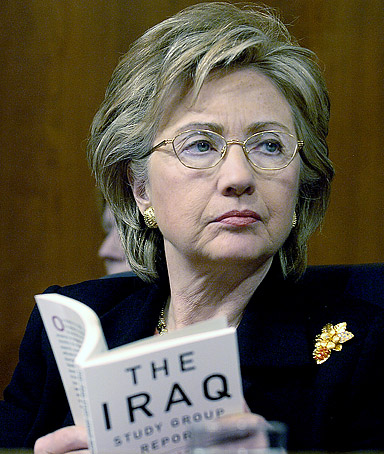
Women of a certain age are thrilled by the prospect of a possible President Hillary.
Over-50 females are so overjoyed that one of their own might finally achieve the nation’s top political post — better two centuries late than never — that they’re willing to overlook the former First Lady/Senator/Secretary of State’s not-so-minor defects.
Like her very long resume, minus significant achievements. Like the blood of a million Iraqis dripping off her warmongering claws. (She voted in ’03 for a war she ought to have known would soon become unpopular. What was she worried about? That New Yorkers, liberal as they come, wouldn’t reelect her in ’06?) Like the ugly optics of America’s first woman president having to be a former First Lady because we can’t find a woman who made something of herself on her own merits. Like the nasty truth that, aside from her chromosomes and body parts, she’s not one of them at all — just another slimy influence peddler. Not to mention, she doesn’t stand for anything, or have a vision that differs from the status quo.
For the rest of us, a Hillary Clinton presidential campaign is an incredibly depressing thought.
Starting with her much-vaunted Inevitability. Doesn’t anyone remember that we went through this in 2008? Democrats didn’t want her then; we don’t want her now. Can’t we do better than this tired old warhorse?
When I see Hillary’s chipmunk-cheeked countenance, I see old. Part of this is primal physicality, the sexist social conditioning that says guys age more gracefully than women. (How much you wanna bet that’d be the opposite under matriarchy?) But Hillary is actually old: she’ll be 69 on Election Day 2016. Her supporters point out that that’s the same age as Reagan when he took office. Considering the fact that the Gipper went senile in office, they might want to hush up.
For years, Clinton has played it hush-hush about her not-so-awesome health. This is one of those times, as with John McCain, where you’d have to pay close attention to the candidate’s veep pick.
More than calendar years, Hillary is spiritually old. She’s a throwback to another time, one that’s never coming back.
Like Reagan, Hillary Clinton is a cultural hiccup. Disconnected. Passé.
Post-Obama, who for his many shortcomings managed for a time to project a youthful vigor, an elderly President Hillary would mark a grim, dutiful restoration, a political return to the 1970s and 1980s, when she toiled as a talented if sketchy corporate lawyer. She harkens to the presidency of her husband, a conservative who banished liberals from the Democratic Party, severing the last connection between Washington’s political classes and the people they were supposedly sent to serve, never to be seen again after post-9/11 Bush went insane right-wing and Obama codified and expanded it all.
I don’t mind that she stayed married to Bill after he cheated on her. What’s unforgivable is that she stayed married to him after he destroyed American politics.
I hate Hillary — if you think about the million Iraqis she voted to kill, how can you not? — yet I don’t feel contempt for her.
What I feel is bored.
Bored, tired and sad. We have so many pressing systemic problems (economic decline, endless war, national purposelessness); is it really possible we’re going to have to endure another four-to-eight years of a presidency that doesn’t even try to address what ails us?
Because, let’s face it, there is no universe in which a President Hillary kicks ass. There is no chance, not even a remote one, that she is interested in decisive action on climate change (her “plan”: hope for young people to form a “movement“), bold moves to reduce unemployment or raise wages, putting an end to NSA spying on Americans (she’s in favor of it), or slamming the breaks on Washington’s kneejerk reaction to anything that happens overseas: blow it up (she’s really in favor of war).
You only get one thing by electing a President Hillary: a first woman president.
An old, tired, unimaginative, uninspiring, boring, useless, first woman president.
Yay.
(Ted Rall, syndicated writer and cartoonist, is the author of the new critically-acclaimed book “After We Kill You, We Will Welcome You Back As Honored Guests: Unembedded in Afghanistan.” Subscribe to Ted Rall at Beacon.)
COPYRIGHT 2014 TED RALL, DISTRIBUTED BY CREATORS.COM
SYNDICATED COLUMN: America’s “Moderates” Are Wild, Crazy — and More Extreme Than Any “Extremist”

Every damn second of every stupid day in this brain-dead nation, the insipid overlords of America’s inane corporate news media put out the same message: extremism is extremely bad.
9/11? Carried out by Muslim extremists. The couple who murdered two police officers in Las Vegas this week? Right-wing, anti-government extremists. Washington gridlock? A Republican Party taken over by intransigent extremists (the Tea Party).
In this official narrative, unquestioned by left and right alike, moderation and centrism are equated with reasonableness. So Hillary Rodham Clinton describes herself as a middle-way realist who values compromise — i.e., a moderate and therefore a Very Serious Person, and thus qualified to be president.
To be feared and marginalized, by contrast, are those the system defines as “extremists.” (Some might call them men and women of principle. But that would be on funny little blogs no one reads.)
If you criticize the mainstream (the current government, the biggest corporations, the most well-connected journalistic elites) in a sustained way — especially if you call those in charge out for breaking their own rules and laws — you will be categorized as one of these horrible “extremists.”
A recent example: Michael Kinsley, lately of Slate and The New Republic (the most centrist of moderate magazines), comparing Glenn Greenwald to Robespierre (within the context of the pretty extreme French revolution, extreme) in the New York Times (down to the tone of any given sentence, the most centrist of moderate newspapers), for the sin of complaining about NSA spying, drone assassinations, Guantánamo and other (when you think about it, extreme) U.S. government activities that violate — U.S. government laws.
Though, actually, “violate” doesn’t quite go far enough. Bombing countries without bothering to declare war against them pees all over the Constitution, numerous federal laws — the whole spirit of the American endeavor. Extreme, no?
This is some bass-ackward shit.
For asking that political elites obey their own laws on domestic spying and not assassinating American citizens on American soil — even being willing to mount an actual filibuster over it — Rand Paul gets portrayed as a wacky fringe loony-toons extremist. For listening to our calls and reading our email and dropping Hellfire missiles on American citizens — and children! — without a warrant, Barack Obama is a moderate.
What the “moderates” call “mainstream” is, in truth, about as extreme as it gets.
Ex-Obama Treasury Secretary Timothy Geithner, formerly of Goldman Sachs and thus the embodiment of reasonable centristness, is pushing a book in which he claims a tough-call-but-had-to-do-it middle ground for an action that was in reality about as extreme as can be: his reaction to the 2008-09 economic collapse. Geithner gave $7.77 trillion in taxpayer money to the banks and their top executives, no questions asked, and $0.00 to the homeowners and unemployed people whom the banks screwed. (Also, there’s this: he failed. The economy is still tens of millions of unemployed behind; consumer confidence is still shit. NPR still asks his opinion.)
Speaking of books, Hillary’s latest brief, called “Hard Choices” — a phrase meant to conjure Solomonic wisdom — kinda sorta admits she “got it wrong” by voting for the U.S. war against Iraq.
Democrats voting for Republican-led wars — that’s the “crossing the aisle” “bipartisan” “seriousness” Manhattan and Beltway pundits like Thomas Friedman and David Ignatius, both of whom did the same, approve of.
Moderate.
The war, of course, was an extreme affair. Between $2 trillion and $6 trillion down the shitter. 4,500 dead American troops. Hundreds of thousands whose brains will never be right again. At least a million — more like two million — dead Iraqis. Who can count them all? A Second World oil state, secular socialist and authoritarian, reduced by ten years of American occupation to civil war and total societal, political and economic disintegration, Third World going on Fourth.
And what about the way it began? Ginned up out of whole cloth. Even by U.S. standards, it takes some big stones to justify attacking a nation that never attacked, or threatened to attack, you. Pretending that you know about WMDs, and then getting caught lying, and then not only not apologizing and immediately withdrawing, but doubling down (c.f., the “surge”)?
Pretty damn extreme, if you ask me. (No one does. Cuz, like, my saying so makes me extreme.)
Hillary’s “hard choice”? In 2003, Bush was popular, so was invading Iraq. She assumed that, when she ran for reelection to the Senate in 2006, Bush and his war would still be the bee’s knees.
Sorry, Iraq.
Hard choice, you see.
With “moderates” like this…
Yet the Moderate Class is so loud about the evils of extremism. Writing in the very moderate Washington Post opinion pages, a forum that promoted the Iraq War and publishes the full range of editorial opinion from center-right Democrat to center-right Republican, Paul Waldman asked “How much does right-wing rhetoric contribute to right-wing terrorism?” after the Vegas cop shooting.
Here’s a taste: “When you broadcast every day that the government of the world’s oldest democracy is a totalitarian beast bent on turning America into a prison of oppression and fear, when you glorify lawbreakers like Cliven Bundy, when you say that your opponents would literally destroy the country if they could, you can’t profess surprise when some people decide that violence is the only means of forestalling the disaster you have warned them about.”
Mmmaybe. But how about a little context? Assuming that “the fetishization of firearms and the constant warnings that government will soon be coming to take your guns” inspired the Vegas shooters, shooting cops isn’t good. But: (only) four people died, including the killers, in Vegas. Four dead due to right-wing extremism.
Millions died in the Iraq War. This slaughter wasn’t inspired by, but directly carried out by a bipartisan Congress coming together to support an attack editorial writers on both the Right and what passes for the Left agreed upon.
Why doesn’t anyone at the Post ask “How much does mainstream Democratic-Republican rhetoric contribute to U.S. state terrorism?” Here is how Waldman would write if he or his editors were sane:
“When you broadcast every day that an isolated Middle Eastern dictatorship is a totalitarian beast bent on reducing America to ashes and irradiated rubble, when you appease lawbreakers like Bush, Cheney, Rumsfeld and John Yoo, when you say that antiwar activists would literally destroy the country if they could, to score cheap political points, you can’t profess surprise when some people decide that war is the only means of forestalling the disaster you have warned them about.”
When you run an extremist government that markets itself as realistically moderate, your smartest move is distraction.
See Huge Crazy Extremist Kettle point at tiny extremist pot.
Like, even when a politician considered extremist within the bounds of the two-party “mainstream” gets defeated by an even more extreme extremist, mourn the loss of the slightly less extreme extremist as “A Bad Omen for Moderates.”
And ask things like this:
Why on earth would a 22-year-old from Florida with a “passion for Islam and teaching children about the Quran turn into something more disturbing”?
The New York Times approvingly quotes Veronica Monroy, a friend of a man who carried out a suicide bombing against Assad government forces in Syria: “He deplored any kind of negativity, and was always the first to lend a hand if you needed one. He was religious, but definitely not an extremist,” Monroy said. “He was loving and caring, and I know he came from a strong, loving, supportive home.”
Get the message? Jihad is extreme. Fundamentalists are severe and cold, not loving or caring — and they’re usually the damaged products of dysfunctional families. Extremism is “negative.” Follow a religion. Just don’t really follow all its tenets.
Like that stuff about giving up all your stuff and joining the poor: that would be extreme.
If you step back from the media maelstrom, it isn’t all that hard to frame another narrative: here was a young man, his father from Israeli-occupied Palestine, politicized by the global onslaught against and oppression of Islam, led by the U.S. Done with “doing typical adolescent things, such as playing video games,” he put his ass on the line and made the supreme sacrifice for his coreligionists.
Moner Mohammad Abusalha’s wasn’t my brand of “extremism.” Nevertheless, unlike Hillary’s vote to destroy Iraq, carefully calibrated to maximize her centrist warmongering cred as a “realist” “moderate,” it’s one I can respect.
(Ted Rall, Staff Cartoonist and Writer for Pando Daily, is the author of the upcoming “After We Kill You, We Will Welcome You Back As Honored Guests: Unembedded in Afghanistan.” Subscribe to Ted Rall at Beacon.)
COPYRIGHT 2014 TED RALL, DISTRIBUTED BY CREATORS.COM
SYNDICATED COLUMN: What Would President Hillary Do? She’ll Be the First Woman President.
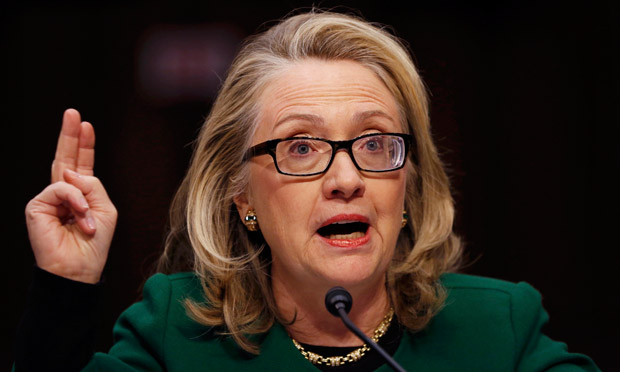
Hillary is the talk of 2016. Will she run? According to the pundit class whose water cooler speculation gets repackaged as “conventional wisdom,” the nomination is the former First Lady’s for the asking. Following a coronation that saves her cash and bruising primary battles, it’s currently hard to conjure a Republican who can stop her from taking the general election too.
But to paraphrase a recent viral music video, there’s one thing that no one knows:
What would President Clinton II do?
I posed this question to “Ready for Hillary,” the main pro-Hillary Super PAC. “Ready for Hillary focuses on grassroots organizing, not policy,” replied Seth Bringman. “Policy decisions would be up to the campaign if Hillary runs, which we are certainly encouraging her to do. We amplify the causes Hillary is advocating for and spread the word to our more than one-and-a-half million supporters. We have done so when Hillary spoke out on immigration reform, health care, voting rights, unemployment insurance, and the government shutdown.”
Given that the pre-primary season doesn’t begin for another 18 months, it’s a little early to expect a fully fleshed-out policy platform from a probable candidate. But HRC isn’t a fresh young thing. She’s been kicking around politics for decades — so it’s more than a little strange that neither her fans nor her enemies has a clue what she’d do about a host of issues.
Long before 2000, Al Gore’s longstanding interest in climate change signaled that the environment would have been a priority in his administration. Beginning with his testimony in the 1971 Winter Soldier hearings, John Kerry’s career path predicted a preference for diplomacy over war. On the other hand, it was similarly clear long before 2008 that a John McCain Administration would have been belligerent and quirky, featuring occasional alliances of convenience with Democrats.
So, what about Hill? The only agenda item anyone could have reasonably predicted was a revival of HillaryCare — which is now basically Obamacare. The biggest arrow in her quiver is gone.
Ready for Hillary says it has raised $4 million from 33,000 donors during 2013. That’s a lot of money. You’d think the donors would know what they’re buying, but if that’s the case, they’re keeping it to themselves.
Hillary leads every poll of the Democratic field for 2016. But why? What is it about her that makes some liberal voters swoon?
I combed the Internet looking for signs of something approximating a political agenda. I pushed out the following question to social networks: “Support Hillary for 2016? Can you tell me what she would DO?”
The closest approximation to an answer came back: “She would be the first woman president.”
Yeah, we knew that — but would she be a first woman president who fires drones at wedding parties, or a first woman president who pushes for a $20/hour minimum wage, or a first woman president who continues the first black president’s policy of not using government to try to create jobs? Would she be a first woman president who closes Guantánamo? Would she be a first woman president who continued NSA spying on Americans? Would she be a first woman president who adds a public option to the Affordable Care Act?
As far as I can tell, the (Democratic) arguments for Hillary boil down to the following talking points:
- Unlike Obama, who let himself get rolled by the Republicans, Hillary is tough and battle-tested. She’s a good negotiator.
- She’s an experienced manager. “Ready on day one,” she argued in 2008. She knows everyone and everything in government.
- Like her husband, she’s somewhat more liberal than Obama.
- She’s pre-disastered, thus electable. If there were any more Travelgates, Whitewaters, etc., the media would have uncovered them by now.
These are personality traits, not prescriptions for America.
Hillary Clinton isn’t a candidate — she’s a brand. She doesn’t offer a set of ideas; she projects a vague sense of competence that feels absent in the current White House. (Didn’t she used to hold some kind of big job in that place?) Despite having held high posts in government, she can’t point to a single major legislative or ideological achievement — but that doesn’t matter to her supporters.
Mostly, Hillary represents the potentiality of a historical symbol: first woman president. As soon as she takes the oath of office, her campaign’s biggest goal, shattering the ultimate political glass ceiling, will have been achieved.
If this feels familiar, it should. Senator Barack Obama was Clinton in 2006 and 2007, projecting calm after long post-9/11 years of jittery Bushisms, with a light resume that served as a blank slate, allowing people to project their hopes and ideals upon him. In the end, all that mattered was the beginning: winning as a black man. For the Obamabots, all that followed — protecting Bush’s torturers, the bankster bailouts, the drones, the NSA — was beside the point of their politics of identitarian symbolism.
What will happen to the long-term unemployed under Hillary? If 2008 serves as a guide, the 2016 campaign will pass without Americans much talking or thinking about such questions.
(Support independent journalism and political commentary. Subscribe to Ted Rall at Beacon.)
COPYRIGHT 2014 TED RALL, DISTRIBUTED BY CREATORS.COM
SYNDICATED COLUMN: Smart Young People Who Snub Politics Are Smart

Smart Young People Reject Public Service — Because They’re Smart.
America’s best and brightest don’t go into politics.
(By which we mean mainstream two-party corporate politics. Democrats, Republicans, Washington. Politics as activism, as the ongoing debate over how we should live our lives, remains of great interest to young people.)
Mediocrity among the members of the political class is often cited as a reason for government’s ineptitude, its inability/unwillingness to address the great problems we face today: climate change, soaring income inequality, the Third Worldification of America. If we had smarter, more charismatic politicians, the reasoning goes, we’d get smarter, more effective problem-solving.
Forget it. The word from the trenches of academia is that that’s not going to change. Millennials just aren’t interested.
A national survey of 4200 high school and college students conducted last year found that only 11% might consider running for political office. Most young people say they want nothing to do with a career in government.
We don’t know how that number compares to the past. As Fareed Zakaria points out, “Americans have always been suspicious of government. Talented young people don’t dream of becoming great bureaucrats.”
Still, like other mainstream media types, Zakaria thinks disinterest in public service has increased. “The New Deal and World War II might have changed that for a while, but over the past 30 years, anti-government attitudes have risen substantially,” he says.
Young people think politicians can’t/don’t make much of a positive impact in people’s lives. In a poll of 18- to 29-year-olds, Harvard’s Institute of Politics found a 5% increase, to a third, in the portion of young adults who believe that “political involvement rarely has any tangible results.” When asked about the statement “politics today are no longer able to meet the challenges our country is facing,” 47% agree and 16% disagree.
I was thinking about this a few weeks ago while researching a column about the possible presidential candidacy of Hillary Rodham Clinton in 2016. First lady, senator, secretary of state — Clinton is one of the most successful political figures of our time. Yet what has she actually accomplished? How has she changed the life of the average American? Where is the big feather in her foreign policy cap? She’s been busy, but she hasn’t done anything historical — and the same could be said of almost all her peers.
Future coulda-been bests and brightests are paying attention to Washingtonian disfunction. “How deep is the disengagement?” Ron Fournier asked in The Atlantic. “I spent two days at Harvard, and couldn’t find a single student whose career goal is Washington or elective office. One wouldn’t expect to hear this at the Kennedy School of Government.“
Which prompts two questions:
Why are the young eschewing politics?
Can we do anything to make a career in politics/government more appealing?
Zakaria offers a “why”: “The ever-increasing obstacles — disclosure forms, conflict-of-interest concerns, political vetting — dissuade and knock out good candidates.”
I disagree. Getting exposed for financial or other improprieties is a concern for some political prospects in their 50s or 60s. But the most that your average 21-year-old college senior has to worry about getting outted over is drug use, and if current trends continue, no one is going to care about that in a few years. After all, George W. Bush and President Obama both used cocaine.
Not long ago I was approached by an Important Democratic Party Official about running for Congress. After he saw a talk I gave to a group of high school students, he pronounced himself so impressed that wouldn’t stop calling me. The party needs you, he said. So does your country.
Heady words. And I’m at least as egotistical as the next bear. So I looked into it.
I wasn’t concerned about personal disclosures. I’d be running as far to the left as you can in today’s Democratic Party; my district is very liberal on social issues. Whatever came out wasn’t bound to hurt my prospects. Anyway, I have a theory about political strategy: your opponents can’t use your deeds against you. They can exploit your denial of those deeds. Candidates who reveal their own skeletons find the electorate much more forgiving than when they’re uncovered by their opponent’s “opposition research” team.
Money would have been a major issue. You need at least $1 million to fund a Congressional campaign. It’s easiest if you have it yourself, and if you have rich friends willing to bankroll you. I don’t.
This is a grim system we have. “Wealthy candidates who try to buy office with their own money tend to lose, but in order to set up a campaign, you have to know a lot of wealthy people and wealthy special interests — and that’s something that most of us are not privy to,” Craig Holman, government affairs lobbyist for Public Citizen, told CBS News.
I might have been able to sell out to local business interests in exchange for favor chits to be cashed in later. But then, why run in the first place? For me, the point of running for Congress is to have a chance to change things for the better.
Washington has plenty of you-scratch-my-back-I’ll-scratch-yours corruption as it is. (I’m talking to you, Former Treasury Secretary/Warburg Pincus President Timothy Geithner.) They don’t need more from me.
The money thing is pretty much insurmountable.
Even presupposing a dramatic upturn in my finances (Powerball win? Selling a kidney to a desperate Internet billionaire? Kickstarter?), there’s the question of what I could accomplish in Congress. This is assuming, of course, that I win. Half of candidates lose, with nothing to show for their million-plus bucks.
Like the kids at Harvard, I can’t think of a single Congressman or, for that matter, Senator, who has managed to achieve much for the working class, or the environment, or anything big, since, well — my entire life. And I’m 50. As a political junkie, I would have heard of something.
Senator Ted Kennedy was one of my political heroes. I worked for two of his presidential campaigns. But let’s be honest. What was his greatest political accomplishment? Probably the State Children’s Health Insurance Program. A nice piece of law to be sure, but a small-bore one — and hardly worth spending decades of your life sitting through endless boring meetings.
And that’s what you do in Congress. You sit on your ass waiting for a chance to talk to people who are waiting for you to shut up so they can talk.
To an empty chamber.
Perhaps I should amend this: politics makes sense for right-wingers.
Republicans have radically transformed American society in recent years: legalized torture, extraordinary rendition, Guantánamo concentration camp, preemptive warfare, the doctrine of the unitary executive, sweeping tax cuts for the ultrarich and yes, even Obamacare — that one was dreamed up by the right-wing Heritage Foundation.
Liberals and progressives, on the other hand…there’s not much for us in the world of mainstream politics.
If we want leftie — most young people are — bright young things to enter public service, public service is going to have to change first. Obviously, that doesn’t seem likely. So if you’re a smart, energetic young person who wants to change the world, there’s still a place to do that.
Not in Congress.
In the streets.
(Ted Rall’s website is rall.com. Go there to join the Ted Rall Subscription Service and receive all of Ted’s cartoons and columns by email.)
COPYRIGHT 2013 TED RALL

